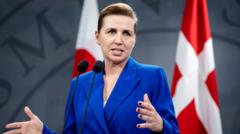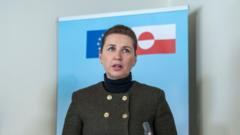Denmark continues to set the standard for work-life balance worldwide, showing huge importance on employee trust, ample vacation time, and a supportive welfare state. Experts share insights on what makes Danish workplaces thrive in harmony with personal life.
Decoding Denmark's Secret to Work-Life Balance Excellence

Decoding Denmark's Secret to Work-Life Balance Excellence
Exploring Denmark's impressive work-life balance, which places a strong emphasis on trust, flexibility, and supportive policies for employees.
In Denmark, a unique work environment fosters unparalleled happiness and productivity among employees. Gabriel Hoces, a tech professional in Copenhagen, emphasizes the central role of "trust" in his workplace, stating, "Bosses aren't coming in to check if you put in eight or nine hours a day; they mainly care if you completed your projects." No wonder, then, that Denmark consistently ranks among the top five countries for work-life balance according to the OECD.
The latest figures reveal that only 1.1% of Danes work 50 or more hours a week, a stark contrast to the world average of 10.2%. Author Meik Wiking, known for his extensive research on the topic, observes, "Almost 60% of Danes say they would continue to work if they won the lottery." He attributes this contentment at work to positive workplace policies, including a minimum of five weeks of paid vacation a year and generous maternity and paternity leave—six months in Denmark compared to just a few weeks in other countries like the UK and US.
Wiking notes an empowering concept at Copenhagen’s Tivoli Gardens where staff act like CEOs within a three-metre radius, initiating proactive service and cleanliness, which enhances a sense of ownership and fulfilment among the employees. Janine Leschke from Copenhagen Business School explains that the Danish work culture emphasizes flexibility, making room for parents to adjust their schedules around family commitments.
For many, like Hoces, expectations in the US workplaces, such as the pressure to respond over weekends, represent an alarming departure from this balanced approach. In contrast, business leaders like Casper Rouchmann highlight an inherent trust within the Danish corporate structure. "You don't need to ask me to leave early," he says, illustrating a relaxed, understanding leadership style.
While Danish policies provide strong safety nets for employees, Rouchmann warns that it may inadvertently dampen entrepreneurial spirit compared to more risk-oriented cultures like the US. Samantha Saxby, a US HR expert, observes a cultural difference between Denmark's collective approach to well-being and the US emphasis on individual achievement.
However, Saxby also sees a global shift where organizations worldwide are beginning to align with the principles of Denmark’s work-life balance by offering benefits that prioritize employee wellness. Programs for unlimited paid time off and mental health days are gaining traction as companies recognize the value of well-rested and balanced employees.
Denmark’s exemplary work-life balance offers valuable lessons for the world, showcasing the immense capacity of trust, flexibility, and comprehensive support to cultivate a healthy workplace.


















